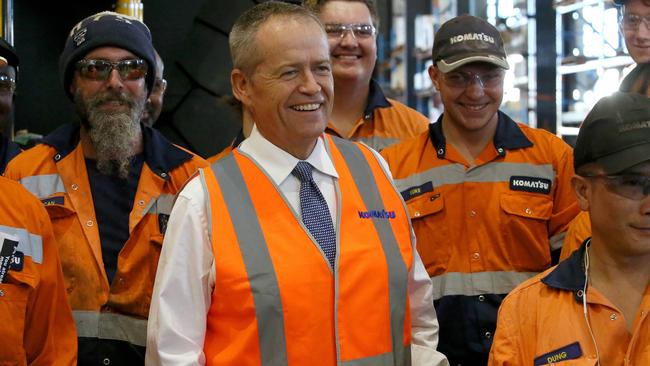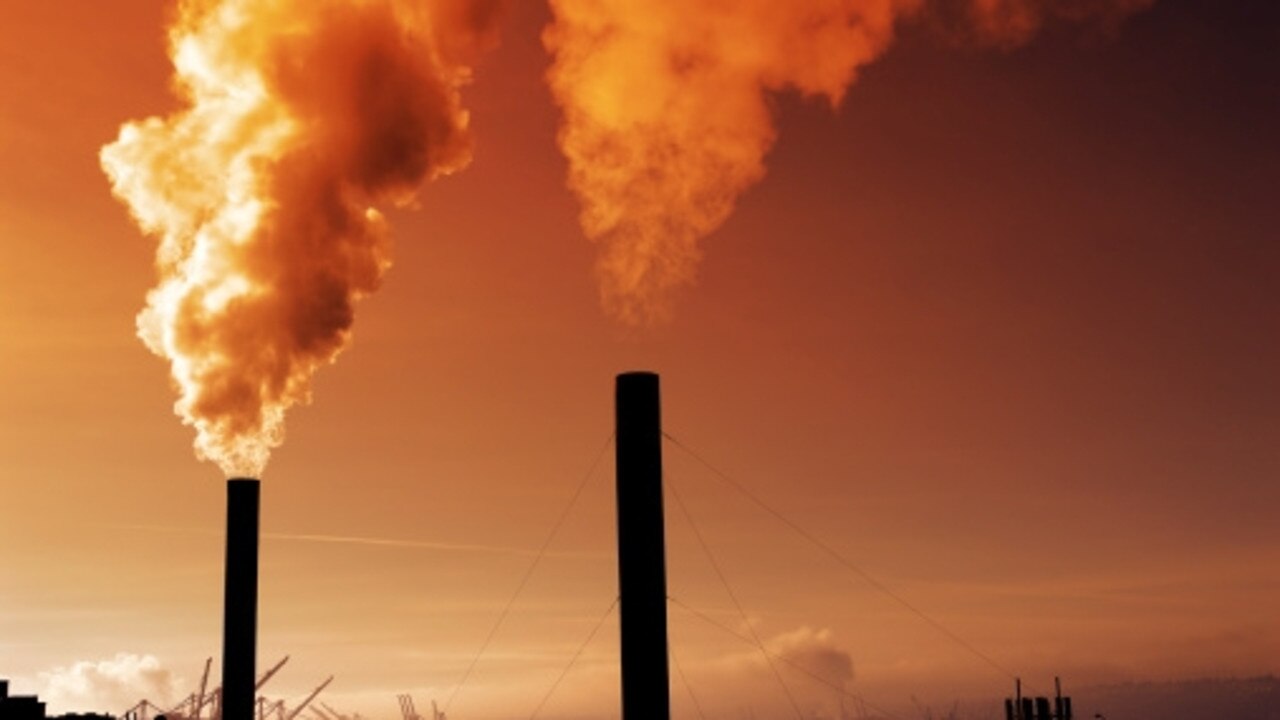Business demands climate fine print from Labor
Business is demanding that Bill Shorten unveil his plan to meet Labor’s 45 per cent emissions reduction target.

Business is demanding that Bill Shorten unveil his plan to meet Labor’s 45 per cent emissions-reduction target and explain how an expected cap-and-trade scheme for large polluters would work, amid new modelling showing that the economic cost of his policy could be as much as $502 billion.
Australia’s top business leaders slammed the major parties yesterday — and singled out the Opposition Leader — for providing an “unacceptable” lack of detail over the impacts of their climate and energy policies on Australian industry.
The attack came after peer-reviewed modelling released yesterday by BAEconomics suggested Labor’s plan to reduce emissions by 45 per cent on 2005 levels by 2030 would cost the economy $502bn, even if Mr Shorten agreed to use “carryover” credits accrued from Australia exceeding its Kyoto climate change commitments.
The analysis by Brian Fisher — a former head of the Australian Bureau of Agriculture and Resource Economics — found the cost could be reduced to $254bn over the decade if Mr Shorten also used international offsets, an option the Opposition Leader is actively considering.
Labor energy spokesman Mark Butler — who rejects Dr Fisher’s analysis — told The Australian yesterday his party had a “longstanding position of supporting international credit trading, subject to strict standards of robustness and integrity”.
Business Council of Australia chief executive Jennifer Westacott said Dr Fisher’s peer-reviewed modelling emphasised the “urgent need for political leaders to outline the crucial detail behind emissions-reduction policies”. It was incumbent on political leaders “to explain how we are going to achieve these targets,” she said.
“It is unacceptable for political leaders not to clearly spell out how obligations will be met before they are implemented.
“These choices will have a major impact on Australian jobs and the scale and rate of our economy, not to mention the serious sectorial effects that will hit hardest in regional communities.’’
Ms Westacott said Dr Fisher’s modelling raised “legitimate and important questions’’ about the policy detail.
“For example, will the target be economy-wide or sector-specific? Will certain sectors be carved out? What is the design of the mechanism to drive the abatement? How will the mechanism be implemented? Will carry-over of Kyoto overachievement be included? Will international trading be allowed?”
Minerals Council of Australia chief executive Tania Constable backed the use of overseas offsets, an option Scott Morrison has ruled out in favour of taking action in Australia under his plan to reduce emissions by 26-28 per cent on 2005 levels by 2030.
Ms Constable said yesterday that using “credible and verifiable international offsets along with carryover of emission reductions from the first and second Kyoto commitment periods” would be “central to Australia implementing a measured response”.
National Farmers Federation chief executive Tony Mahar said Labor’s emissions reduction target and 50 per cent renewable energy target were “at the high end” and demanded Mr Shorten explain how they would affect farmers. “The NFF requires further detail on how the 45 per cent target is to be achieved,’’ he said.
“While there is no observable intent to directly burden the agriculture sector with additional costs that seem likely to result from a higher emission target, our concerns about the impact of flow-on costs from, say, the transport sector remain real.’’
The Prime Minister yesterday challenged Mr Shorten to explain how he would achieve his 45 per cent emissions reduction target, questioning how much of the burden would fall to the agriculture and transport sectors.
“Bill Shorten refuses to tell Australians what the cost of his reckless emissions targets will be on the agricultural sector, on power prices, on jobs, on wages,” Mr Morrison said.
“Bill Shorten has a plan to put up the cost of living on the basis of a reckless emissions target that he can’t even tell you how he’ll meet.”
Speaking in Perth, Mr Shorten entertained the use of international offsets in Labor’s policy, declaring: “We haven’t ruled out the use of foreign carbon credits.”
Pressed on whether he would use “carryover” Kyoto credits to meet Labor’s more ambitious target, he said an announcement was due within weeks. “If you want to see real action on climate change, if you want to see the Australian economy modernise and transition to a greater proportion of renewables, vote Labor in about seven weeks’ time,” he said.
Dr Fisher told The Australian Labor would need to reduce emissions to 333 million tonnes of carbon dioxide equivalent by 2030 to meet its 45 per cent target.
“If a Labor government were to use the carryover to meet its target, then we calculate that the accumulative GNP losses over the decade would be $502bn,” he said. “If they were to allow international emissions trading, then that cost almost halves to $254bn.”
Labor has attacked Dr Fisher’s analysis as “rubbish modelling”, saying it assumes storage or firming costs for renewable energy to be as high as $200/MWh when Snowy is offering firmed renewable contracts at $70/MWh.
Printing Industries Association of Australia chief executive Andrew Macaulay, who represents a sector employing 50,240 people and supporting 6500 businesses, told The Australian emissions targets pursued by both parties were an “absolute folly”. He warned they were “essentially a policy to export Australian jobs”.
“Energy policy is a disaster for this country. The ALP are adding real uncertainty to the equation and the Coalition don’t appear to have a plan,” Mr Macaulay said. “The printing packaging industry has been severely impacted by the ongoing debacle that is energy policy … those who can are looking at offshoring”.
Australian Chamber of Commerce and Industry chief executive James Pearson seized on Dr Fisher’s modelling suggesting that Labor’s 45 per cent target would cost workers up to $9000 a year in lower wages. He said that undercut an ACTU push for a new “living wage” equivalent to 60 per cent of the median wage.





